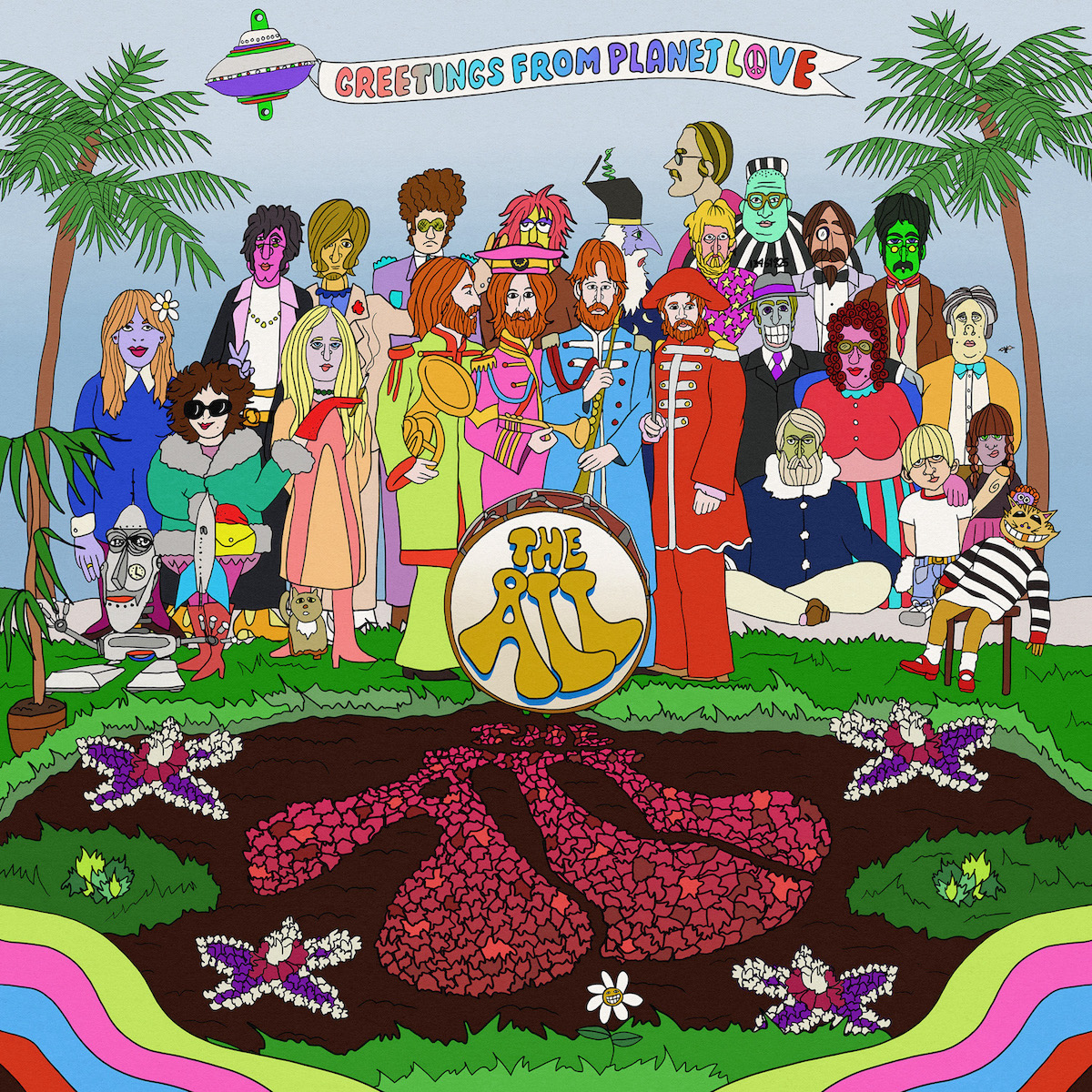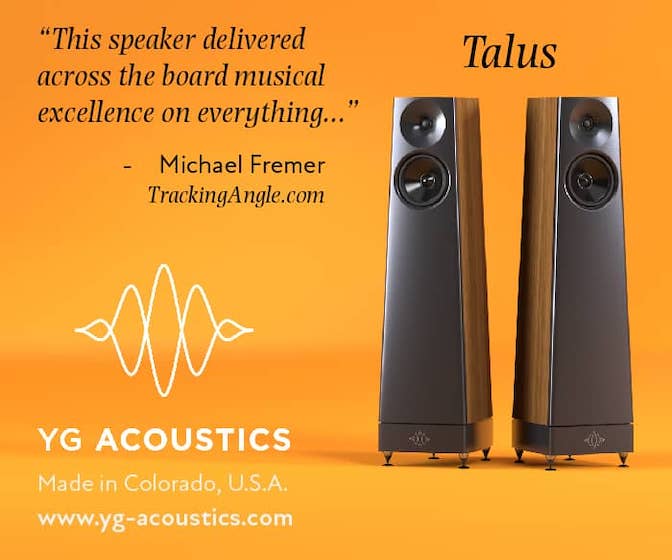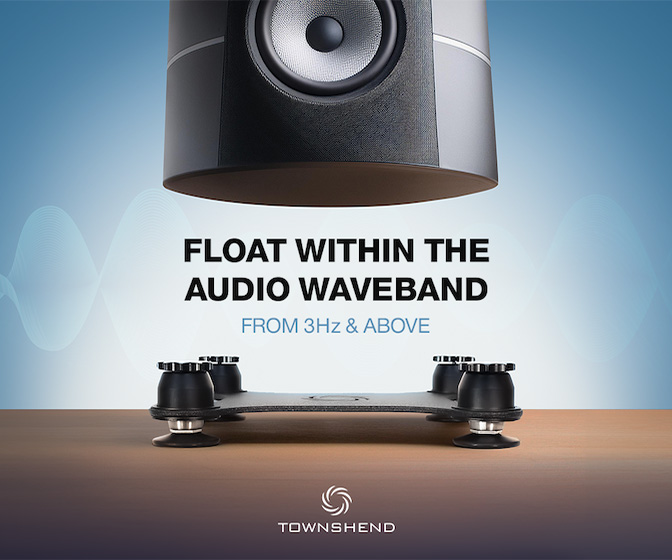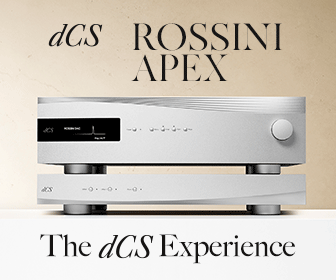Andrew Gold's Tribute to 1960s Psychedelia, "Greetings From Planet Love" is Reissued
The Double 10" Set is a Celebration of the Greatest 60s Band That Never Was: "The Fraternal Order of the All"
Imitation is - as you may have heard - the sincerest form of flattery. In the music world, however, it’s a slippery slope: the listener crosses his or her finger when a composer or performer attempts to pay homage to another style or genre hoping that the final result is a well-done and tasteful tribute. It’s not as though Andrew Gold needed to imitate anyone, but out of his love of 1960s psychedelic rock ‘n’ roll he devised a fictitious band (The Fraternal Order of the All) and produced an album paying tribute to his favorite luminaries of that era. Titled, Greetings From Planet Love, the album was initially released on CD in 1997, but has been reissued by Cherry Red Records and Esoteric Records in a double 10” package featuring updated cover art by illustrator Jess Rotter who integrated some of Gold’s original drawings into a Sgt. Pepper style design.
Unfamiliar with Andrew Gold’s musical output? Now is the perfect time to right that wrong. Andrew was a songwriter, singer, producer and multi-instrumentalist and he was also the son of composer Ernest Gold (see Exodus) and Marni Nixon who provided the sung vocal tracks for several major Hollywood film productions and actresses (Natalie Wood’s parts in West Side Story, Deborah Kerr’s in The King and I, and Audrey Hepburn’s in My Fair Lady). Andrew became a fixture in the early 1970s L.A. production and session scene adding guitar parts and arrangements to many well-known albums. He also served as musical director for Linda Ronstadt on many of her biggest-selling albums and several of her tours. In the studio, Andrew even worked as the second engineer on parts of Joni Mitchell’s Blue album.
Gold had aspirations of his own, setting out on a solo career in 1975 with his eponymous album, Andrew Gold and a 1976 follow-up What’s Wrong With This Picture? which produced a #7 US hit, “Lonely Boy”. 1978’s All This and Heaven Too contained “Thank You For Being a Friend” which - of course - you know as the theme song to the Golden Girls series. However, if you haven’t yet done so, you should listen to Gold’s original version; the bridge alone is worth the price of admission. In 1980, Gold released one more major label album - Whirlwind - before taking a long solo work hiatus. In the 1990’s, he released several albums, which were produced in his studio; Greetings From Planet Love was one of those records.
Only a few years ago, Andrew’s work again infiltrated popular culture. A track from his 1996 album, Andrew Gold’s Halloween Howls recently became a social media viral sensation. Replete with its own dance moves, “Spooky Scary Skeletons” has been used over four million times on Andrew’s official TikTok account. The Halloween album was recently reissued by Craft Recordings in 2021 and was reviewed by Michael Fremer and I interviewed his widow Leslie Kogan about it as well. The album cover also featured artwork from Jess Rotter. Sadly, Andrew Gold passed away in 2011 from heart failure at the far too young age of 59.
Greetings From Planet Love begins with a brief trippy intro track, “Rainbow People” that commences with a nod to circa '67/’68 Beatles with plenty of cello, sitar and backwards tracks, and that's not the last we’ll hear of those accouterments. A sudden switch from Beatle sounds to the Beach Boys takes place on the next track, “Love Tonight”, which evokes not only a Wilsonesque songwriting style, but also the production one might expect on Pet Sounds: plucked Fender guitars float in an ocean of spring reverb, harpsichord serves as the keyboard basis, etc. But, it’s Gold’s vocal approach to the song that really sells the package: his phrasing and slightly exaggerated Californian accent find a sweet spot somewhere between Carl and Brian’s vocal sound. As if that’s not enough, to compliment the entire song he even conjures up the sound of Mike Love. He’s so convincing, too: I could almost picture Gold wearing one of Love’s signature baseball caps while he was recording those parts. “Love Tonight” isn’t an homage, it is a musical master-stroke.
Gold revisits the Beach Boys (as they would have revisited the Four Freshman) on “Tuba Rye & Will’s Son / Balloon in the Sky” with a gorgeously arranged and executed vocal before slipping into “Balloon in the Sky” which is more of a Gold original decorated with Beach Boy flourishes, this time - however - recalling the band’s Smiley Smile phase.
At this point in the record, Gold’s true voice becomes more prominent as the following track - “King of Showbiz” - doesn’t attempt to stay in line with the late 60s vibe, but sets out on it’s own journey fitting more appropriately in the era in which the album was originally released. Co-written - and produced - with 10cc’s Graham Gouldman, the song features Gold’s infectious understanding of melody and his expert production and arranging skills; “King of Showbiz” is a perfect slice of pure pop.
It’s not just the sound of the Beatles and the Beach Boys that Gold mines, “Chasing My Tail” explores early Pink Floyd territory while “FreeLove Baby” (sung by Jimmy Caprio) and “Groovy Party at Jimmy’s Pad” embrace the campy and comedic side of the mid-60s. While these two tracks are both fun, tongue-in-cheek nods to 60s silliness, they give Gold a chance to showcase his excellent and underrated guitar skills and allow him some space to have fun and really dig in. A theatrical riff on Jim Morrison’s vocals and The Doors permeates “Ride the Snake” (of course) and Gold also provides compelling approximations of Ray Manzareck and Robby Krieger on Vox-style keyboards and guitar.
Have you seen that 1966 footage of John Lennon and Bob Dylan conversating in the backseat of a cab in the UK? Imagine if that taxi were to deliver those fellows straight to a recording studio; that “what-if” premise might give you an idea of what “Mr. Plastic Business Man'' sounds like (think “Cry Baby Cry”/“Ballad of a Thin Man” mash-up).
Side 3 serves as an interconnected musique concrète medley of sorts beginning with a brief McCartney-style mini-song before morphing into full-on Lennon territory on “Wink of the Third Eye.” Both songs contain plenty of snippets of spoken word dialog and Beatley winks. Andrew himself even laughs through a few of the vocal lines. Gold soon genuflects to the Byrds on “Space and Time”, which is replete with ringing 12-string electric guitars, tight, lush vocal harmonies, a galloping ride cymbal and an ultra-compressed guitar solo that seals the deal on this authentic replication. Jimmy Herter takes the lead vocals on “Time is Standing Still” and this begs the question of why Andrew doesn’t handle all of the lead vocals himself. The theory, I believe, is that Andrew wanted this project to appear as though it were a true band (even though he completed nearly all of the tracks himself). Jimmy Herter and Jimmy Caprio both help to create the illusion that there are other members of “The All” who contribute their talents.
Nodding to Revolver’s “Tomorrow Never Knows”, Greetings From Planet Love ends with “Tomorrow Drop Dead”: a droning take on the significant Beatles number; Gold’s version also cleverly incorporates elements of “Revolution Number 9” and “Paperback Writer”. At times, Andrews’s alter-ego, The Fraternal Order of the All, recalls The Rutles; both groups have lasting significance: they are at once fun - and funny - yet are also designed with a great level of care and detail. If you liked the Rutles project, you’ll have no problem exploring the psychedelic world that Andrew Gold manifests on this double 10” record package.
Double 10” records? I can only guess that the album - which clocks in at 51 minutes - was just a little too long for one 12” record and not long enough to warrant a full second disc. However, the production costs still included a dual pocket gatefold sleeve and pressing of two 10” records anyway. This could have been a fantastic 12” package: it would happily sit next to my other Andrew Gold records and not be sequestered to my rarely perused 10” section. A 12” sleeve would also have given a little more real estate to the super-groovy Jess Rotter and Andrew Gold cover art. The disc’s splatter design would have had additional room with which to splatter. Though I’m not a big fan of artistic/etched sides in vinyl packages, such an approach here would have been fair game, especially given the opportunity to further embrace the album’s psychedelic aesthetic.
That being said, both 10” records provide plenty of dynamism and have no problem showcasing Andrew’s skills behind the mixing board. The discs are excellently pressed and virtually noise free. The album’s sonic drawbacks have to do with the digital/midi-based instruments that Andrew employed to create his psychedelic pastiche. The drums on many tracks (if not all) are clearly electronic, as are the strings which no doubt emanated from a keyboard. So, an artificial, metallic sheen can be heard throughout. Those artifacts are more pronounced on the .wav files; tamer on vinyl. That being noted- and given the organic limitations of what Gold had on hand to work with in his studio during the 1990s - these tracks probably could not be made to sound better. Ya gotta just go with it.
Dated electronic sonic artifacts aside, Gold’s vocals are big and detailed, capturing the warmth and charm that his voice provided. Andrew’s attention to detail on achieving authentic guitar parts and sounds is extraordinary; were he still with us today, he’d be a go-to expert on recreating the sonic character of historical guitar tones; again, not just the tones, but also what notes the guitarists might have chosen to play.
It’s fun to imagine Andrew as a sort of mad scientist in his studio during the 1990’s; I picture him devising this project late into the night. There’s no doubt that he had fun doing so, his love for this style of music and his clever wit exude from his songwriting and production acumen; his attention to detail was second to none. While the aim of Andrew’s time-traveling journey was to replicate the psychedelic sounds of the 1960s, it was clearly a musical era he was comfortable inhabiting and listening to these tracks informs us that - in addition to being an excellent musician - Andrew Gold was also a music fan. It’s fortunate for listeners that he had the production ability to succeed in sharing this fun vision with us. Of course, it is unfortunate that Gold is no longer with us to witness the second act that his 1990s output has enjoyed over the last few years.












































